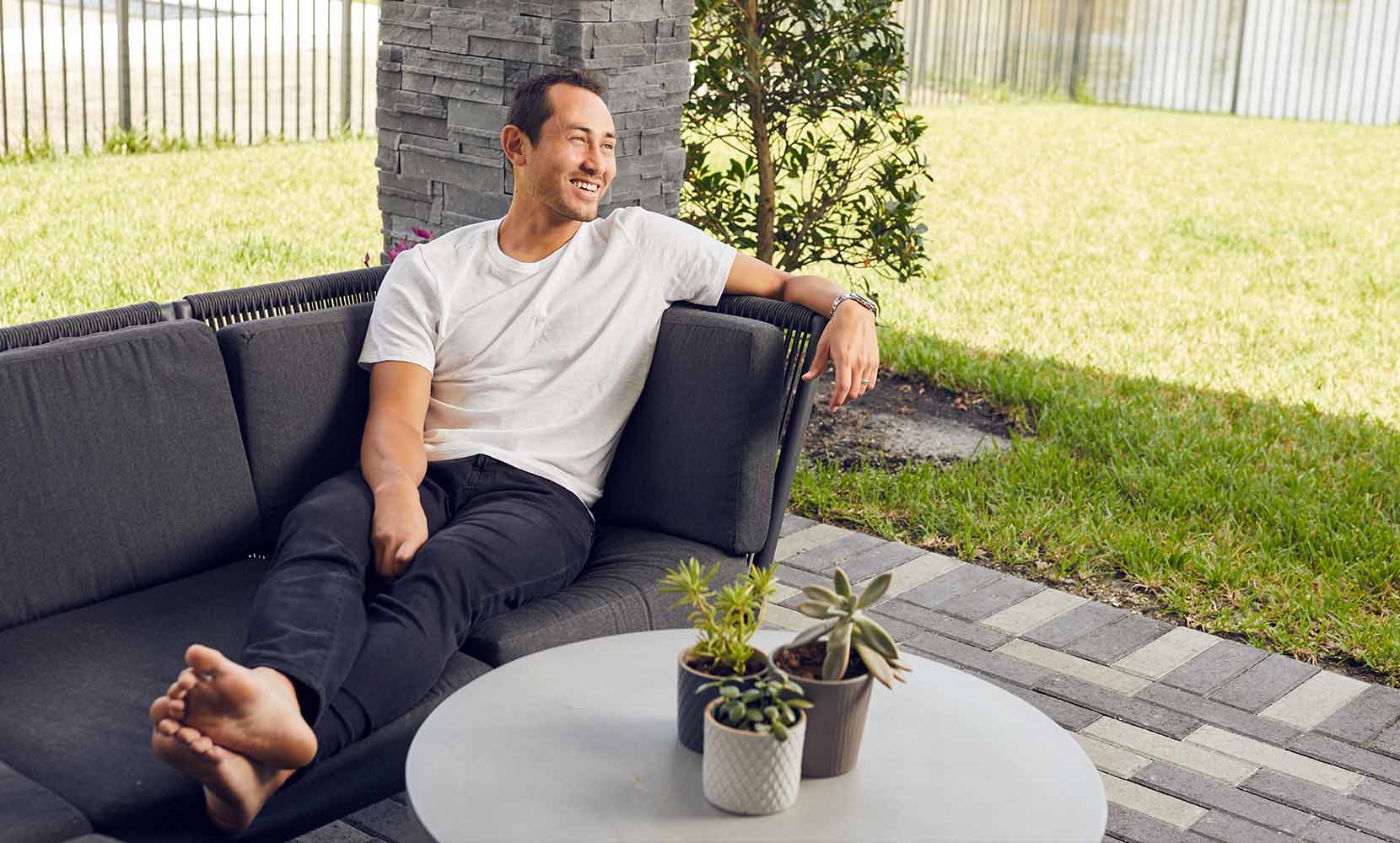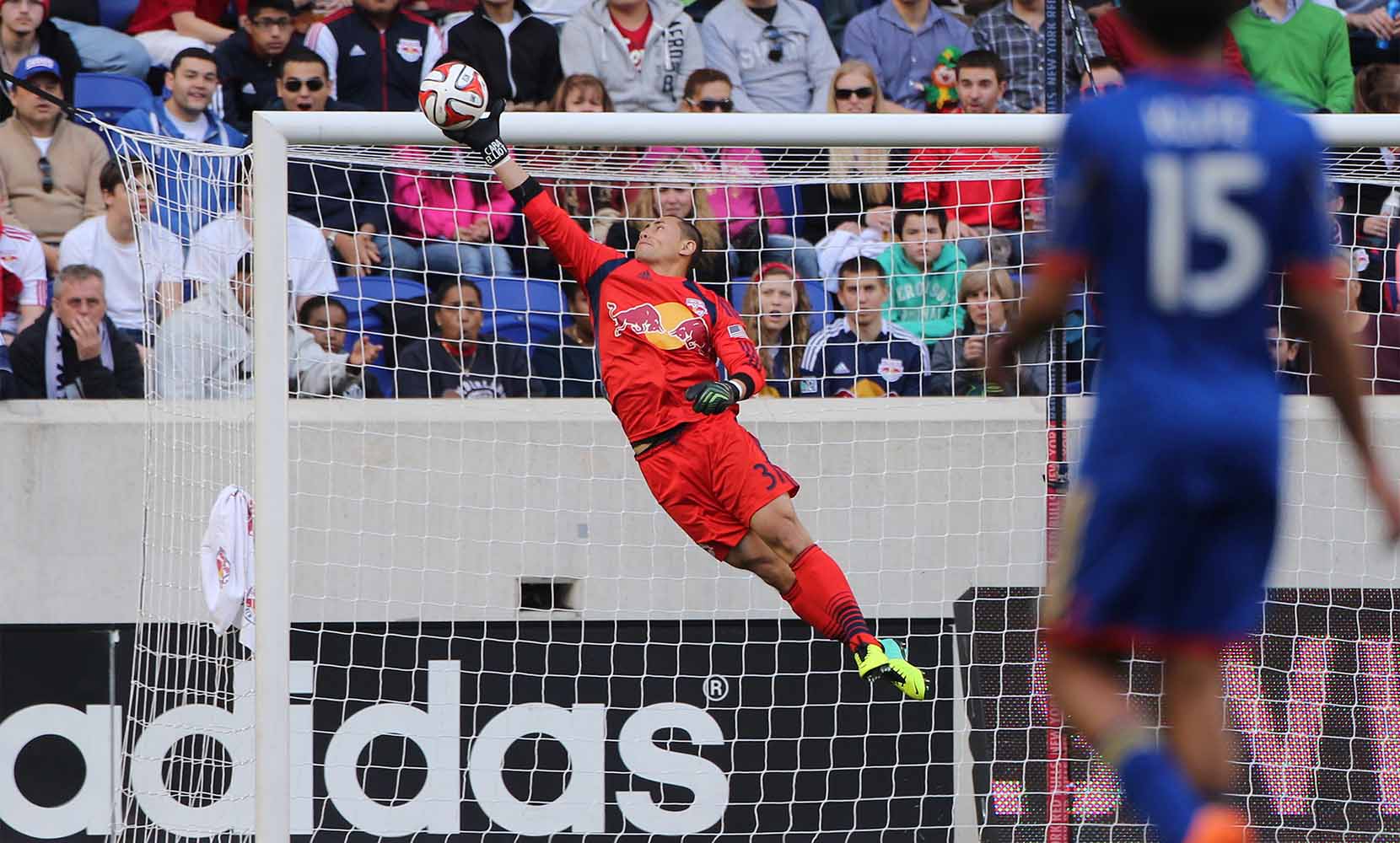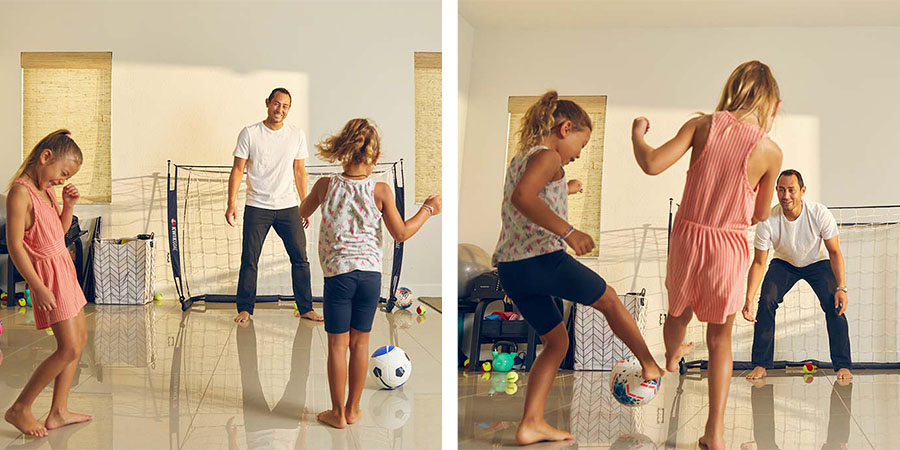
Athletics
Portland Magazine
December 1, 2021
Before his recent retirement from professional soccer, Luis Robles ’06 earned the name “Ironman” and broke Major League Soccer records, but he is quick to direct credit for his successes to a couple simple lessons he learned from his UP goalkeeper coach.
By Katelyn Best
Photos by Mary Beth Koeth

WHEN LUIS ROBLES ’06 decided to retire from professional soccer after 14 seasons, he didn’t plan to tell anyone. He knew he was done the moment he’d broken his arm while playing for Inter Miami; why make a big deal out of it? He figured he’d just step back.
It was an impulse that says a lot about the former Pilots goalkeeper. Robles excelled at UP, setting a school record with 346 career saves, and went on to become a legend in MLS, earning three Supporters’ Shields with the New York Red Bulls and setting an all-time league record for consecutive starts that seems almost untouchable. But Robles prefers not to make things about him.
That unselfishness manifests in many ways, small and large—from his fabled work ethic to his generosity with fans to the fact that when talking about his career, he tends to say “we,” referring to himself and his wife, Cara, more than “I.” That humility has defined him as a player and as a person—and he learned it, in part, at the University of Portland.
ROBLES GREW UP IN SIERRA VISTA, ARIZONA. His dad was a military man, retired from the Army but still working on the Fort Huachuca base just outside of town. Robles aspired to a soccer career from an early age, and the work ethic that he came to be known for as a pro cemented in his teen years.
“On Friday nights, instead of going out, we were out on the field working on our game,” remembers his best friend, midfielder Miguel Guante ’06, who also ended up at UP. “You know, I was working on crossing, and he was dealing with crosses, or shooting. We just couldn’t get enough of training on our own.” Together with two other guys from Sierra Vista, the pair played on the same club team in Tucson, an hour’s drive away.
By his junior year, Robles was getting recruiting calls from schools across the country. “It’s such a great ego thing, all these universities calling and saying, ‘We want you, we’re going to give you a scholarship.’ ” He got offers from Stanford, Harvard, and Brown—schools where he could have been a starter right away and gotten a big-name degree to boot.
The call he got from the University of Portland was different: there were no grand promises, no attempt to recruit Robles in the traditional sense. “The phone call was simply saying, ‘Hey, you have five college visits. We want you to take one of them here,’ ” Robles remembers. “It was very, ‘This is what we can offer.’ ”
He and Guante visited the same weekend. They took in a game—a 1–0 win by the Pilot men over Indiana—and got to know the coaching staff.
“The line that got me was from Clive Charles,” he says. “I go into the office and we talk about recruiting. He says, ‘If you want to be a rocket scientist, go to Stanford. If you want to be a banker, go to the Ivy League. If you want to be a professional soccer player, come here.’ And that was it, I was done.”
Charles wasn’t bluffing (no pun intended). For one thing, Portland offered something few other schools in the country did: a full-time dedicated goalkeeping coach, Bill Irwin. The onetime Timbers keeper had trained a string of goalies who’d gone on to the professional ranks, including US Men’s National Team stalwart Kasey Keller ’10.
Beyond the program’s outsized list of professional alumni—and Charles’s and Irwin’s own resumes as professional players—Robles and Guante could tell that this was a place where they’d be both challenged and nurtured. “It was comforting for us,” says Guante, “but it was also challenging in the way that we wanted to be challenged. I think we always felt like we were going to develop on the field and off the field, be pushed in ways that we hadn’t been pushed before.”
IRWIN WAS IMPRESSED WITH THE 6' YOUNGSTER. “He fit the profile for a goalkeeper,” says Irwin. “Real good size. Good hands. He just, watching him play, he ticked all the boxes for us.”
Robles wasn’t really ready for college soccer, though. His potential was obvious, but he’d never gotten the high-level training needed to compete at that level. What’s more, the Pilots already had a starting keeper, senior Curtis Spiteri ’05.
“In Portland,” Robles says, “there’s honor in the way that they value their seniors and their upperclassmen. [Spiteri] was on scholarship; he was one of the best goalkeepers in the country.”
So the team made the somewhat unusual move of red-shirting Robles for his freshman year. For UP to give some of their limited scholarships to goalies at all was one thing—to give one to a guy who wouldn’t play his first year was a big statement. It was an investment in Robles.
He remembers that semester as one of the hardest of his life. “During practice, I’ll be honest, I just wasn’t good,” he says. “That jump from high school to college...the ball was coming so quickly, the game was moving so quickly, everyone was so much stronger than me.”
Compounding Robles’s frustration, Guante was making a big impact. “Not only was Miguel a starter, but he was excellent, like, amazing, and a big part of the team.” The two were roommates, and Robles would be stuck at home while Guante was on the road with the team, competing and winning.
More than anything, he was determined to pay back the trust the school had placed in him. “I just wanted to, if anything, not embarrass Bill,” he remembers. “Guys talk in the locker room. They know who’s on scholarship.... And here’s a guy who’s not going to contribute in any way, and he’s on scholarship. And then by the way, he’s not good in training?”
Ultimately, though, that year was critical to Robles’s development, both as a player and as a person. “I don’t know if I could have developed properly if I went to a school where they made me a starter right away,” he says. “Also, just from a character development standpoint, it was a good year, because I needed to be knocked off whatever perch I was on.”
To Guante, the way Robles handled that difficult year says a lot about him. “Something that you see less and less of every day is players that are that talented being patient enough to see it out,” he says. “Versus maybe just entering the transfer portal and going somewhere where they’re going to play right away.”
The Pilots program wasn’t a school of hard knocks, though. It was, as advertised, a nurturing environment, almost a second family. Irwin and Charles would invite homesick students over for a homemade meal or to do a load of laundry. Players from the men’s and women’s teams would meet up at night to get in an extra training session.
Robles and Guante strengthened their friendship in that family setting. They’d talk about their goals within soccer; Robles was there for Guante when Charles passed in 2003 and when Guante’s dad was deployed to Iraq. Guante repaid that support when Robles’s brother also went to Iraq.
Irwin, meanwhile, gave Robles the individual training he needed to succeed. At some point, Irwin suggested he come to the practice field one morning a week for an extra training session. One day a week turned into two, and eventually the extra sessions became a daily ritual.
“I ruined his knees, I ruined his back,” Robles says of that training. “This is why I feel so indebted to him in every way. He was committed to me, and my experience really was about the graciousness of his time and his expertise that he passed onto me. If I didn’t have that, there’s just no way that I could have been the professional that I was.”
Irwin’s voice would loop in Robles’s head as he played, telling him to stay focused or keep his eyes on the ball. Much of what the coach taught applied to life off the field, too. Two themes in particular have stuck with him since.
First, “take care of the little things, and the big things will work themselves out,” Robles says. “I think in the end, the big things worked out because he helped me define what those little things are: having the right mentality in practice, knowing that practice isn’t always going to be perfect.”
Second, “the one that I always loved—and still love—is, leave the place better than you found it.” Robles was hungry to play, but he also knew that ultimately, everything was about the team’s success, not his own.
“You commit to what the group’s doing, and you’re mindful of the next person that’s coming in, so that when you leave, it’s not felt, it’s just seamless,” Robles says. “That’s something that I tried to be mindful of in college, which allowed me to not be insecure, right? If I’m pouring into other people and thinking about the legacy piece, even when I move on...instead of looking over my shoulder, I want the person right next to me, walking with me, so that we’re doing this together.”

Photo by Tim Clayton/Corbis via Getty Images
Robles, New York Red Bulls, makes a save during the New York Red Bulls v. Colorado Rapids, Major League Soccer regular season match at Reb Bull Arena, Harrison, New Jersey, March 15, 2014.
AFTER GRADUATING, ROBLES WAS SELECTED in the 2007 MLS SuperDraft by DC United. But MLS was still considered a backwater at that time, and he dreamed, like so many players do, of playing for a big European club. He landed a deal with FC Kaiserslautern and headed to Germany.
For a while, everything was falling into place. He started with the second team, moving up to the first team the next season; a few months later, he landed the starting spot after the club’s top keeper, German international Tobias Sippel, was injured, and he held that spot for the rest of the season. That summer, he married Cara, his high school girlfriend, and represented the United States at the 2009 Gold Cup.
Robles broke into the national team because he’d been doing well in Germany, but Kaiserslautern hired a new manager that summer, and ironically, spending time with the national team instead of the club knocked him down the depth chart for the 2009–10 season. Robles rode the bench most of that year, then moved to Karlsruher SC, where he took a similar path—spending his first season as a starter and falling out of favor the following year.
Five years into his time in Germany, his career seemed at a dead end, and he and Cara were dealing with a series of personal challenges. They were far from home at a time when family felt more important than ever.
“It was a dark time in my life,” he remembers. “My dad was dealing with some health issues, my wife’s dad had stage four oral cancer, we had just experienced a miscarriage, and we were pregnant again. So, there were a lot of things going on. And it’s sort of what led to the clarity that we had [about] coming back to Major League Soccer.”
Robles’s agent struggled to make any connections in MLS, he said in a video the league produced in 2016. Robles had a problem: per the league’s byzantine roster rules, because he’d played with the national team, he had to go through the allocation order, rather than signing directly with a team. Except those rules had been designed for stars like Tim Howard and Landon Donovan, not for a guy who hadn’t been capped in three years and had hit a rocky patch in his career. To use an allocation pick on a relative unknown like Robles was a big risk.
Cara had an idea. If his agent couldn’t make something happen, why not do it himself? “She said, ‘Why don’t you just Google it?’ ” he said in the 2016 video. “Are you kidding me? That’s so lame. I’m not going to Google ‘Major League Soccer.’ Well, anyways, she won.”
Robles got in touch with Ali Curtis, who was in charge of player relations for the league. He told Robles the Red Bulls were interested, but it would be tough. He’d have to prove himself all over again.
In the end, after nine other teams passed, New York used their pick on him.
“They were willing to take a chance,” says Robles. Like the Pilots once had, the Red Bulls made an investment in him. “There’s no chance that they had any idea what they were getting. I had no idea.”
Any MLS fan will already be familiar with what New York got with Robles. His return to the US came at a moment of renaissance for the Red Bulls and for the league: Portland, Vancouver, and Montreal had just joined as expansion teams; international stars like Thierry Henry, Robbie Keane, and Tim Cahill were choosing MLS; and the league’s average attendance was rivaling that of the NBA and the NHL. Two years before Robles’s arrival, the Red Bulls had moved into a new soccer-specific stadium in New Jersey.
It was against that backdrop that the Pilot standout was to become one of the league’s iconic players. In 2016, he earned the title of “Ironman,” first breaking the record for consecutive complete games played, then consecutive starts, and finally consecutive appearances. By 2018, when he was finally forced to sit a game out due to injury, he had started an astounding 183 games in a row.
Luck is certainly a factor in a streak like that. No matter how meticulously a player trains and prepares, freak injuries happen—as do illness, family emergencies, and other unforeseeable obstacles. On the other hand, nobody gets there without doing just about everything right.
There was no magic wand. Just as Irwin had taught Robles a decade earlier, it was the little things: he ate well and got enough sleep. He hit the weight room religiously and practiced yoga to maintain his strength and mobility. He spent hours watching film. All that preparation added up, and the rest worked itself out.
Irwin’s second lesson was also still on Robles’s mind. The team won the Supporters’ Shield three times during his tenure, and he was named MLS Goalkeeper of the Year in 2015. But when he looks back on his career, he says he doesn’t miss playing; he misses the ways he was able to impact other people.
To that end, he served on the executive board of the players’ union, advocating and bargaining on behalf of teammates and rivals alike. He also relished the opportunities his club gave him to volunteer in the community.
“They had their community partners,” Robles says, “and whatever that was, I was all in. If they needed me to deliver groceries, I’d do that. If they needed me to play with the kids during a soccer camp, I did that. If they needed me to go visit a kid who was dealing with pediatric cancer, I would do that. And to me, it never felt like an obligation. It just felt like a great responsibility, a great way that I can be generous with other people.”

Photo by Mary Beth Koeth
Robles may have retired from professional goalkeeping but, with a family of five, there are stil a lot of balls in the air.
IT WAS PERHAPS WITH IRWIN’S ADMONISHMENTS to value the group over the individual in mind that Robles thought, after a short stint with Inter Miami, he’d slip quietly into retirement—seamlessly, as he put it—and into this next phase of his career. Currently, he works for Overseas Network, managing hospitality and accommodation sales to the US market for the 2022 World Cup in Qatar.
In the end, he did make an announcement, after some urging by the friends he’d made in the soccer world. “It’s not just for you,” he recalls Gregg Berhalter telling him, on the podcast The Call Up last January. "It's for the people who were part of your career, part of the journey."
In his announcement on Instagram, he wrote, “My career is full of memories and great stories yet the thing that sticks out the most is the people whom I’ve met along the way.”
KATELYN BEST is a freelance writer.
University of Portland
5000 N. Willamette Blvd.,
Portland, Oregon 97203-5798
503.943.8000
This website uses cookies to track information for analytics purposes. You can view the full University of Portland privacy policy for more information.
